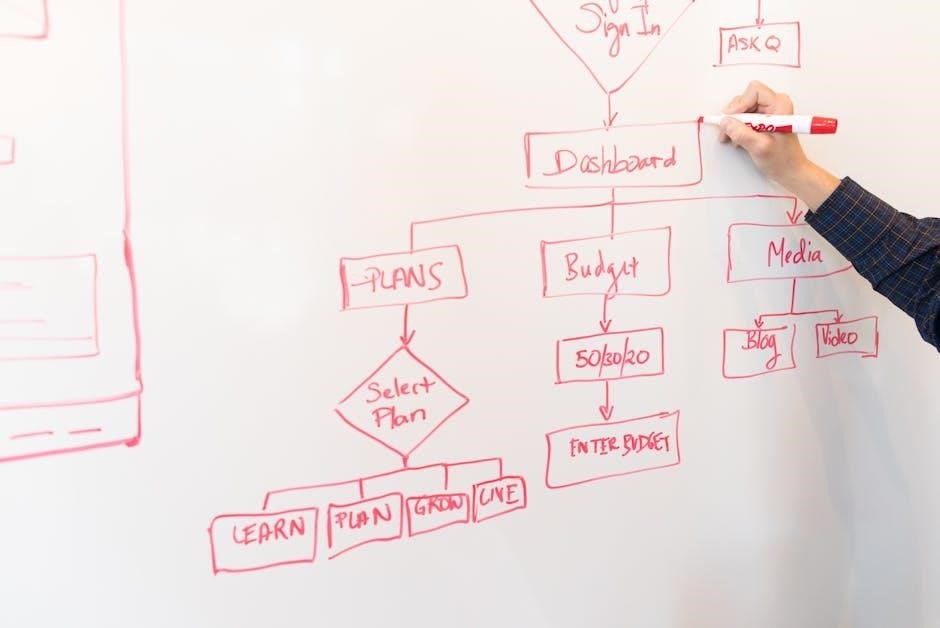michigan appellate opinion manual
The Michigan Appellate Opinion Manual provides essential standards for citation, quotation, and authority in appellate practice, serving as a critical resource for practitioners, judges, and court clerks statewide.
1.1 Purpose and Scope of the Manual
The Michigan Appellate Opinion Manual is designed to provide clear standards for citation, authority, and quotation in appellate proceedings. It ensures compliance with court rules and maintains consistency across legal documents. The manual serves as a comprehensive guide for attorneys, judges, and court clerks, addressing proper appellate practices and procedures. Its scope includes both theoretical and practical aspects, making it an indispensable resource for navigating Michigan’s appellate system effectively.
1.2 Historical Development of the Manual
The Michigan Appellate Opinion Manual evolved from the need for standardized citation practices in appellate courts. First introduced to align with federal citation standards, it has undergone revisions to reflect changes in legal research tools and court rules. Updates ensure compliance with technological advancements and evolving legal precedents, maintaining its relevance and authority in Michigan’s appellate process;

Structure and Organization of the Manual
The manual is comprehensively organized into chapters and sections, ensuring clarity and ease of navigation. It includes detailed cross-references and a user-friendly searchable online version.
2.1 Chapters and Sections Overview
The Michigan Appellate Opinion Manual is divided into clear chapters, each focusing on specific aspects of appellate practice. Sections cover citation standards, court rules, and legal precedents, ensuring a logical flow. Each chapter is further subdivided into detailed sections, providing in-depth guidance on topics such as proper quotation formats and authority citation methods. This structure enhances accessibility, making it easier for legal professionals to locate relevant information quickly and efficiently, while adhering to the latest court standards and updates.
2.2 Key Features for User Convenience
The manual offers a fully searchable online version, enabling quick access to specific sections. Cross-references and a detailed table of contents facilitate navigation, while hyperlinks streamline research. These features ensure that legal professionals can efficiently locate and apply relevant guidelines, enhancing productivity and accuracy in appellate practice, with regular updates maintaining its relevance and utility in the evolving legal landscape.

Citation Standards and Guidelines
The manual establishes clear standards for citing legal authorities, emphasizing the use of official sources and proper quotation formats to ensure clarity and consistency in appellate filings.
3.1 Official Sources and Parallel Citations
The manual emphasizes the hierarchy of citation sources, prioritizing official publications like Michigan Reports and official court websites. Parallel citations, such as those in regional reporters, may follow but are secondary. Public domain citations are preferred for their accessibility and authority, ensuring consistency and reliability in appellate filings. This approach aligns with national standards while addressing Michigan-specific legal research needs.
3.2 Proper Quotation and Authority Citation
The manual outlines precise guidelines for quoting legal authorities, emphasizing accuracy and consistency. Citations must include pinpoint references, and quotations should be verbatim with proper attribution. It also addresses formatting rules for cases, statutes, and secondary sources, ensuring clarity and adherence to appellate standards. Proper citation practices are crucial for maintaining the integrity and persuasiveness of legal arguments in Michigan appellate proceedings.

Using the Michigan Appellate Opinion Manual
The manual’s online version is fully searchable, offering easy access to updated content. Users can navigate via a detailed table of contents and cross-references for efficient research.
4.1 Navigating the Searchable Online Version
The online version of the Michigan Appellate Opinion Manual is designed for ease of use, featuring a robust search function that allows users to quickly locate specific sections or keywords. Cross-references are hyperlinked, enabling seamless navigation between related topics. The table of contents is organized hierarchically, making it simple to explore chapters and subsections. Regular updates ensure the manual remains current, while its user-friendly interface enhances the research experience for legal professionals.
4.2 Understanding Table of Contents and Cross-References
The manual’s table of contents is structured to guide users through its comprehensive sections, ensuring easy access to key topics. Cross-references within the document link related materials, streamlining research and enhancing efficiency. This feature allows practitioners to quickly locate relevant information, ensuring compliance with appellate standards and best practices. The logical organization of content supports thorough preparation and review of legal documents, aligning with the manual’s goal of promoting uniformity in appellate procedures.

Role of the State Appellate Defender Office
The State Appellate Defender Office provides leadership in appellate advocacy, ensuring quality representation and adherence to legal standards. Recent updates reflect its evolving role in appellate justice.
5.1 Responsibilities in Appellate Proceedings
The State Appellate Defender Office manages appellate cases for indigent clients, ensuring high-quality representation. It handles complex legal issues, staffs specialized units like the Juvenile Lifer Unit, and employs professionals such as Deputy Directors and Assistant Defenders. The office also collaborates with legal experts to uphold justice standards, reflecting its critical role in Michigan’s appellate system and commitment to equitable legal outcomes for all clients.
5.2 Recent Updates and Leadership Changes
Marilena David was appointed Director of the State Appellate Defender Office in May 2025, bringing new leadership to enhance appellate advocacy. Updates include hiring a Deputy Director, Assistant Defender for the Juvenile Lifer Unit, and specialists in mitigation and reentry. These changes strengthen the office’s capacity to provide effective representation and align with evolving legal standards, ensuring improved outcomes for clients in appellate proceedings across Michigan.

Updates and Amendments to the Manual
The manual is updated periodically to reflect evolving legal standards and court rules, ensuring accuracy and relevance. The latest version is accessible on the Michigan courts’ website, featuring a searchable format and cross-references for user convenience.
6.1 Frequency of Revisions
The Michigan Appellate Opinion Manual undergoes revisions annually, with updates reflecting changes in court rules, legal precedents, and citation standards. These revisions ensure the manual remains a reliable and current resource for appellate practitioners. The revisions are typically published on the Michigan courts’ website, ensuring easy access for legal professionals to the most up-to-date guidelines and standards.
6.2 Accessing the Latest Version
The latest version of the Michigan Appellate Opinion Manual is accessible through the Michigan courts’ official website at courts.mi.gov/courts/michigansupremecourt/pages/. The online version is fully searchable, ensuring easy navigation and quick access to updated standards. Legal professionals are encouraged to regularly check this official source for the most current guidelines and revisions.
Michigan Court of Appeals and Supreme Court
The Michigan Court of Appeals and Supreme Court oversee appellate jurisdiction, ensuring adherence to legal precedents and standards outlined in the Michigan Appellate Opinion Manual. Their published opinions guide practitioners in citation practices. For more details, visit courts.mi.gov.
7.1 Jurisdiction and Appellate Process
The Michigan Court of Appeals has jurisdiction over most appeals, while the Supreme Court handles cases involving constitutional issues or significant public policy. The appellate process begins with filing a notice of appeal, followed by briefing, oral arguments, and a court decision. The Michigan Appellate Opinion Manual ensures compliance with these procedures, providing clear guidelines for practitioners. For detailed information, refer to the manual available at courts.mi.gov.
7.2 Published Opinions and Legal Precedents
Published opinions from Michigan courts establish legal precedents, guiding future cases. The Michigan Appellate Opinion Manual emphasizes proper citation of these opinions, ensuring clarity and consistency. Attorneys are encouraged to use resources like vLex and Fastcase for comprehensive access to published decisions, which are crucial for building strong legal arguments and understanding evolving legal standards in the state. For more details, visit courts.mi.gov.

Legal Research and Resources
Essential tools include vLex and Fastcase, offering comprehensive access to Michigan court opinions and legal precedents, while the Michigan Courts website provides additional resources and updates.
8.1 Recommended Tools for Attorneys
Attorneys practicing appellate law in Michigan are encouraged to utilize vLex and Fastcase for comprehensive legal research. These platforms provide access to Michigan Supreme Court and Court of Appeals opinions, ensuring accurate and efficient case preparation. Additionally, the Michigan Courts website offers a searchable version of the Michigan Appellate Opinion Manual, complete with cross-references and updated standards for citation and authority.
8.2 Role of vLex and Fastcase
vLex and Fastcase are indispensable tools for attorneys, offering extensive databases of Michigan Supreme Court and Court of Appeals opinions. These platforms enhance research efficiency by providing comprehensive search capabilities and access to updated legal materials. They are particularly valuable for ensuring compliance with the citation standards outlined in the Michigan Appellate Opinion Manual, making them essential resources for appellate practitioners.

Importance of the Manual in Appellate Practice
The manual ensures compliance with court standards, aiding attorneys in adhering to proper citation and authority protocols, thereby enhancing the quality and effectiveness of appellate case preparation.
9.1 Ensuring Compliance with Court Standards
The manual establishes clear guidelines for citation and authority, ensuring attorneys adhere to court rules and maintain consistency in appellate submissions. It outlines proper quotation practices and the use of official sources, helping practitioners avoid errors and align with judicial expectations. Compliance with these standards is crucial for the integrity and effectiveness of appellate proceedings, fostering a uniform approach across all cases.
9.2 Impact on Case Preparation and Outcomes
The manual significantly influences case preparation by providing a structured framework for legal research and citation. Adherence to its guidelines enhances the clarity and persuasiveness of appellate briefs, potentially improving case outcomes. Proper citation practices, as outlined, ensure that arguments are well-supported by legal precedents, strengthening an attorney’s position before the court and contributing to more favorable rulings and judgments.

Recent Developments and Trends
Recent updates include technological advancements in legal research tools and evolving citation practices, ensuring the manual remains aligned with modern appellate standards and practices.
10.1 Technological Advances in Legal Research
Technological advancements have enhanced legal research efficiency, with tools like vLex and Fastcase offering comprehensive databases and advanced search features. These platforms integrate AI-driven algorithms to improve search accuracy and user experience, enabling quicker access to relevant case law and statutes. The Michigan Appellate Opinion Manual is now accessible through these platforms, ensuring practitioners can efficiently navigate and apply appellate standards in their work, aligning with modern legal practice demands.
10.2 Evolving Citation Practices
Citation practices continue to evolve, emphasizing clarity and consistency in legal writing. The Michigan Appellate Opinion Manual updates its guidelines to reflect these changes, ensuring compliance with official sources and parallel citations. Public domain citations remain prioritized, followed by secondary sources, enhancing the transparency and authority of legal arguments. These updates align with technological advancements, providing practitioners with clear, standardized methods for citing appellate opinions effectively in both print and digital formats.
The Michigan Appellate Opinion Manual remains a cornerstone for appellate practice, providing essential guidelines that support practitioners in aligning with court standards and evolving legal expectations.
11.1 Summary of Key Points
The Michigan Appellate Opinion Manual is a vital resource for appellate practitioners, offering clear guidelines for citations, authority, and legal standards. It ensures compliance with court rules, enhances case preparation, and supports judicial efficiency. Regular updates reflect evolving legal practices, while its searchable online format and cross-references improve accessibility. The manual’s role in appellate proceedings underscores its importance in maintaining consistency and integrity in Michigan’s legal system.
11.2 Future Prospects for the Manual
The Michigan Appellate Opinion Manual is expected to evolve with advancements in legal technology and citation practices. Future updates may include enhanced digital features, expanded cross-references, and integration with platforms like vLex and Fastcase. The manual will likely continue to adapt to emerging legal trends, ensuring it remains a cornerstone of appellate practice in Michigan. Its accessibility and relevance will be prioritized to meet the needs of modern legal professionals.
